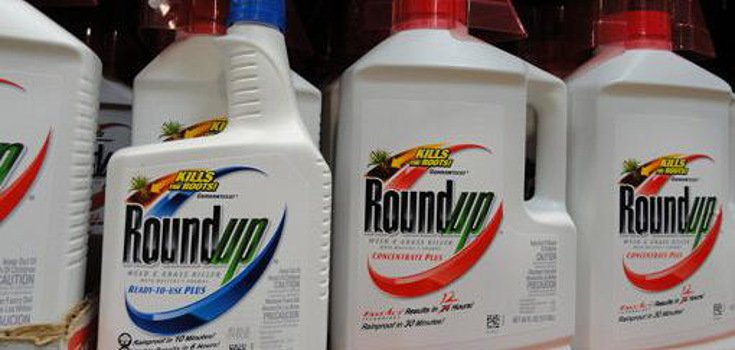Will Monsanto’s Roundup Herbicide Soon Be Banned?

It’s a question that, just a few years ago, would be considered absurd. But as we have seen revolutionary developments in the search for truth regarding Monsanto’s glyphosate-based Roundup herbicide over these past few months, we can now truly ask the question: will Monsanto’s best selling chemical stew finally be banned by the United States and around the world?
When RoundUp first came on the agricultural scene in 1974, sales took off immediately as its ability to annihilate previously troublesome weeds was a prized feature. But as the years passed, the Monsanto product has had unanticipated results.
While the corporation has always claimed it continues to be a “perfect fit with sustainable agriculture,” the notion that anything Monsanto does is good for the ecosystem is questionable at best.
Most recently, it was an arm of the World Health Organization (WHO) that ultimately drove the reality of Roundup’s deadly nature to the mainstream spotlight. WHO scientists declared that Roundup was indeed likely to be causing cancer.
More specifically, the France-based WHO cancer research division known as the IARC launched a sweeping blow to Monsanto in their latest research findings.
We’ll get to those findings in a moment, but first we must consider the most amazing part of the work: the IARC wasn’t even intending to ‘demonize’ Monsanto’s Roundup. They were independently investigating five different herbicide and insecticides, with gloyphosate-based Roundup in the mix.
As reported by The Lancet:
“In March, 2015, 17 experts from 11 countries met at the International Agency for Research on Cancer (IARC; Lyon, France) to assess the carcinogenicity of the organophosphate pesticides tetrachlorvinphos, parathion, malathion, diazinon, and glyphosate (table). These assessments will be published as volume 112 of the IARC Monographs.”
What did they find in their overall review? Roundup was likely to be causing cancer. It is a ‘probable carcinogen.’
Monsanto’s Roundup: A History of Disease
But let’s be clear. It’s not just the WHO that has raised the alarm over Monsanto’s Roundup and its devastating effects on human and environmental health. Instead, the WHO announcement was simply the most widely reported on Roundup study that we have seen. Sadly, it’s not even the most concerning.
It was back in September of 2014 that the International Journal of Toxicology published a much more alarming piece on the dangers of Roundup entitled “Glyphosate Commercial Formulation Causes Cytotoxicity, Oxidative Effects, and Apoptosis on Human Cells: Differences With its Active Ingredient.” As you can gather from its name, the study highlighted the multitude of ways in which glyphosate is wreaking havoc on human cells.
Even more important to the center point of the study, however, is the conclusion that these effects can even be experienced when human cells are exposed to small doses of glyphosate. Even smaller than what agricultural recommendations permit. Even smaller than what we may be getting in our tainted food supply. From the study:
“Aminomethylphosphonic acid (AMPA), and a glyphosate formulation (G formulation) were examined in HepG2 cell line, at dilution levels far below agricultural recommendations… “The glyphosate formulation studied also triggered two ‘death proteins’ in human cells known as caspase 3/7, inducing pathways that activate programmed cell death (apoptosis), a clear sign of significant toxicity.”
This is the chemical that we are not only eating alongside our GMO crops, but drinking. Yup, glyphosate has been found to be polluting waters to the point where even the drinking water supply is contaminated.
From the report, ‘Monsanto’s Carcinogenic Roundup Herbicide Contaminating Water Supply:’
“New research has confirmed what myself and other health conscious individuals have been saying about Monsanto’s best-selling herbicide Roundup — the carcinogenic chemical it contains known as glyphosate has been found to be contaminating the groundwater in areas it is being applied in. What does this mean? It means that toxic glyphosate is now polluting the world’s drinking water through the widespread contamination of aquifers, wells and springs.”
Even more troubling, glyphosate is found in our foods, and subsequently, our blood, urine, and even breast milk. It’s allowed in our food.
Do you think we will achieve a ban on Roundup within the near future?

YES it should be banned. I hope it will be… thank you Anthony
why ban roundup when it has one of the lowest toxicity of any pesticides, surely pyrethrum with much higher toxicity should be banned first?
Should poison be allowed to be sold in the US? Yes it should. I don’t think the answer for any crisis is for the state to force people to make the right decision (usually through violence or theft of your money, which is a different form of violence). The State is more dangerous than roundup. The State has claimed many more lives than roundup. Therefore, I believe that a real solution should envole transparency on the consumer end, such as labeling or a third party testing service. I want the government out of my life. I don’t believe in trying to utilize the bully that is government to solve every problem or crisis.
Furthermore, I invite Dr. Skeptologist to rub himself down in Round Up and then run backwards through a GMO corn field.